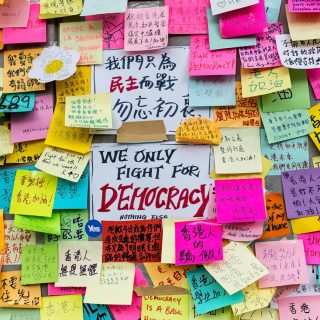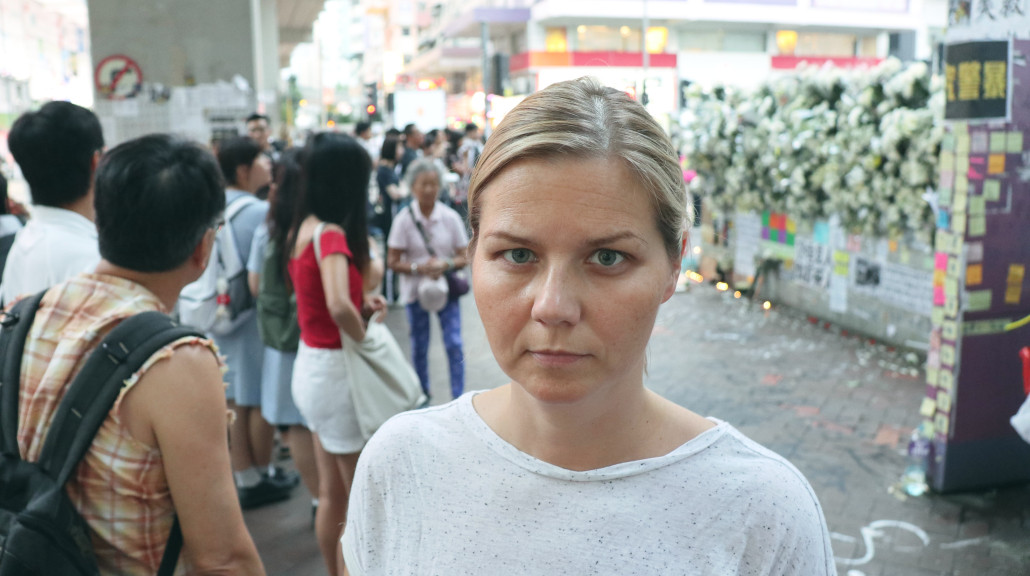Since June, millions of people have been protesting in the streets of Hong Kong. The demonstrations began as a demand that the extradition bill would be scrapped, but in recent months the focus of the movement has shifted to Hong Kong’s right to self-determination and its own political system.
– That fight deserves the Nobel Peace Prize, says Guri Melby, Member of Parliament from the Liberal Party of Norway.

– I have nominated the Hong Kong people for the Peace Prize in 2020 because they are fighting for fundamental rights such as freedom of speech, democracy and the rule of law. What they do matters far beyond Hong Kong itself, both in the region and in the rest of the world, she says.
The demonstration movement has no leadership, and all discussions and decisions take place on online discussion groups. That is why Melby chose to nominate the entire population instead of promoting a single individual.
– In the nomination I emphasize that the nomination goes to the “Extradition-movement” of Hong Kong. I recently visited the city, and most of the people I talked to were very keen to emphasize that this is a people’s movement, she says.
China warns Hong Kong
When protesters in Hong Kong recently were told that it was forbidden to cover their faces while protesting, most people reacted strongly.
Xi Jinping has chosen to keep a close eye on the demonstrations. Until Sunday. In a speech during a state visit to Nepal, he sent the protesters a clear warning:
«Anyone trying to split a region from China will be lost. Their bodies will be crushed and their bones will be dusted,”the party official said, according to the Chinese Foreign Ministry.
He did not mention Hong Kong directly, but the warning has been interpreted as a strong signal to the protesters there – despite having made it clear that they do not want independence from China.
In April, Hong Kong leader Carrie Lam presented a bill that would allow suspected criminals to be extradited to other countries, including China. The proposal triggered major demonstrations in Hong Kong. Many were also angry because leaders from the 2014 demonstrations were sentenced to prison. The demonstrations continued through the spring and peaked on June 16, when an estimated two million people took part in the protests. There are around 7.5 million people living in Hong Kong.
Police have severely cracked down on several demonstrations, and more than 2,400 people have been arrested. The police’s harsh treatment has sparked intense rage.
The protesters operate without a clear lead. Many believe that the struggle stands for Hong Kong survival as a Chinese region with a unique degree of self-government, freedom of speech and democracy.
In September, Carrie Lam withdrew the contentious bill, but protesters have agreed that they will not comply until the rest of their demands are met.
Hopes the nomination can be an encouragement
At the same time, the police are strongly criticized for their harsh treatment of protesters. 2,400 people have been arrested since June.
Melby hopes the nomination can serve as an encouragement for the protesters.
Melby was denied entry to the Norwegian parliament in May because she wore a Chinese T-shirt for «freedom» during a high-profile visit from a powerful Chinese politician.
– I wish all the people I met in Hong Kong, and everyone else, to remain safe.
Nomination text:
At midnight on June 30, 1997, Hong Kong was returned to China, ending 156 years of British rule. This handover is officially known as the Sino-British Joint Declaration. The colony became a special administrative region of China, and would enjoy a high degree of autonomy and its social, legal and economic systems was to be unchanged for the next 50 years. The “one country, two systems” is a constitutional principle which would secure the rights of Hong Kong inhabitants to live their lives independent from the mainland.
However, several international observers and human rights organisations have expressed doubts about the future of the relative political freedoms enjoyed in Hong Kong. This year, protests started in June against proposals to allow extradition to mainland China. Critics feared this could undermine the city’s judicial independence and endanger dissidents.
Demonstrations has since continued and developed to include demands for full democracy and an inquiry into police actions. Millions of everyday residents of Hong Kong have taken to the streets to use their democratic right to protest what they see as an attempt to limit their democratic rights. They have been met with brutal violence and arrests.
I am nominating the people of Hong Kong, hereunder the “Extradition bill-movement” as they are a leaderless movement, for the Nobel Peace Prize. To receive this prize might be further encouragement to the students, teachers, politicians and everyone in Hong Kong who risk their lives and security every day to stand up for freedom of speech and basic democracy. The international community must show that we also stand up for these principles and acknowledges their struggles.
Their contribution to peace is considerable. They remind us of the importance of respect for international agreements, constitutional principles, democracy and freedom of expression.
